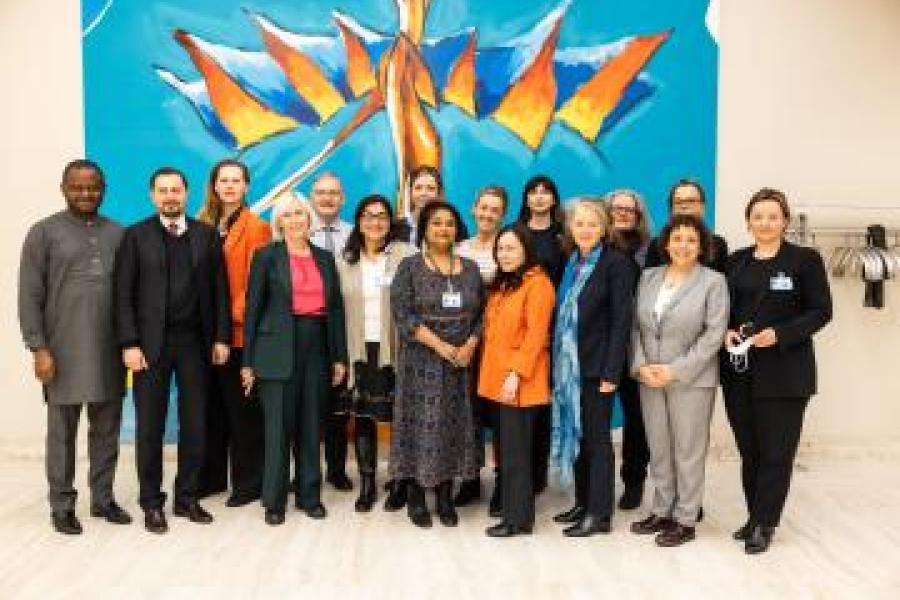From the war in Ukraine to climate change, Deputy Secretary-General and UN leaders in Europe and Central Asia talk sustainability in action
06 aprilie 2022
- UN Deputy Secretary-General Ms. Amina Mohammed has called on UN Resident Coordinators in Europe and Central Asia to help ensure the region does not lose momentum as its 18 countries and territories strive to meet the ambition of the 2030 Agenda for Sustainable Development.

“The 2030 Agenda remains our blueprint for action. Rescuing the Sustainable Development Goals in the Decade of Action across the region is, and will remain, the absolute priority for our work,” Ms. Mohammed told the Resident Coordinators gathered in Geneva for a meeting back to back with the Regional Forum for Sustainable Development.
“Attaining the SDGs will mean overcoming setbacks that had already been caused by COVID-19, and accelerating efforts in-country and across the region.”
The UN Development Coordination Office’s Europe and Central Asia network is made up of Resident Coordinators posted in Albania, Armenia, Azerbaijan, Belarus, Bosnia and Herzegovina, Georgia, Kazakhstan, Kosovo (UNSCR 1244), Kyrgyzstan, Moldova, Montenegro, North Macedonia, Serbia, Tajikistan, Turkey, Turkmenistan, Ukraine, and Uzbekistan.
Unprecedented Challenges
“This region faces unprecedented challenges as war rages in Ukraine,” Ms. Mohammed said.
“The most directly affected country is Ukraine itself, of course. But the effects of the war are being felt across the whole the region. Some are humanitarian, as countries in the region display unprecedented solidarity by taking in refugees from Ukraine. And some are economic, as trade ties and labor markets are disrupted.”
For example, of the 4.3 million people who have fled from Ukraine since 24 February, around 399,000 have crossed the border into Moldova, according to data from 5 April. Given that Moldova is a nation of just four million people, in proportion to its population it is the country with the highest number of arrivals from Ukraine in the world. Around two-thirds of the refugees have moved on to other countries, notably neighboring Romania, but tens of thousands have remained in Moldova.
Among the other pressures in the region is the spillover effect from international sanctions imposed on the Russian Federation, with inflation of currencies, increased import bills, higher consumer prices for food staples, and increased production costs. Specifically, countries in Central Asia are highly dependent on remittances from labour migrants in Russia, which for millions of households are the sole source of income for families. Central Asian countries that neighbour Afghanistan had already been facing impacts from the upsurge in that country’s crisis since in 2021.
In addition, the region is continuing to face the economic and social impacts of the COVID-19 pandemic.
Ms. Mohammed underscored that, as the representatives of the UN Secretary-General for development in countries, Resident Coordinators have convening power, an ability to broker partnerships, and to provide the effective coordination needed to achieve results on the ground.
Given the massive impact of the ongoing war in Ukraine, like their role in the COVID-19 response, Resident Coordinators will be delivering fast-tracked development support to countries in the region.
She added that gender inequality remains a priority to address in the region and is a major hurdle to sustainable and inclusive development. For example, gender gaps are persistent in participation in the labor force (66 per cent men compared to 50.6 per cent women) and wages (about 30 per cent); and women continue to face several major constraints including lack of affordable and quality childcare, the double burden of domestic and professional work and social pressure to conform to gender roles.
In addition, inequalities are fueling political, economic, and social tensions, human rights abuses, violence against women, and conflicts, she warned.
Selected Quotes from Resident Coordinators:
Osnat Lubrani, the UN Resident and Humanitarian Coordinator for Ukraine, highlighted that “the UN is scaling up the humanitarian response, working closely with the Government of Ukraine and using national system to provide multi-purpose cash assistance. But there is a massive destruction of infrastructure that will require significant support to recover.”
Fiona McCluney, the UN Resident Coordinator for Albania, stressed the importance of partnership to deliver on the 2030 Agenda. She also underscored the need to ensure coherence in strategies and approaches, in particular in “safeguarding the focus on climate action and to mitigate the risk that its ambition is scaled back because of pressures of the war and from the private sector.”

















